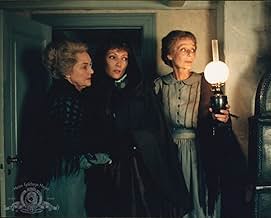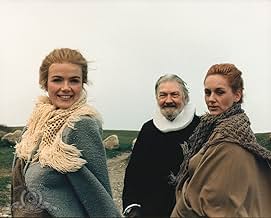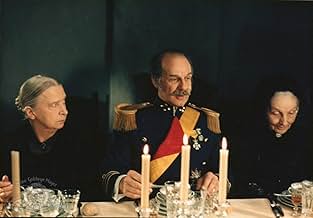VALUTAZIONE IMDb
7,8/10
23.119
LA TUA VALUTAZIONE
Nel XIX secolo una comunità religiosa molto severa di un villaggio danese accoglie un rifugiato francese della guerra tra Francia e Prussia, al servizio delle figlie del pastore deceduto.Nel XIX secolo una comunità religiosa molto severa di un villaggio danese accoglie un rifugiato francese della guerra tra Francia e Prussia, al servizio delle figlie del pastore deceduto.Nel XIX secolo una comunità religiosa molto severa di un villaggio danese accoglie un rifugiato francese della guerra tra Francia e Prussia, al servizio delle figlie del pastore deceduto.
- Regia
- Sceneggiatura
- Star
- Vincitore di 1 Oscar
- 11 vittorie e 8 candidature totali
Stéphane Audran
- Babette Hersant
- (as Stephane Audran)
Jean-Philippe Lafont
- Achille Papin
- (as Jean Philippe Lafont)
Ghita Nørby
- Narrator
- (voce)
Asta Esper Hagen Andersen
- Anna
- (as Asta Esper Andersen)
Recensioni in evidenza
This movie is almost unknown, but it is very good. In a lonely Danish town, two old sisters live remembering a far youths, when, due to a strict puritan education, they had to reject happiness. Lonely, then, the live in a dignified austerity, until Babette, who flies from Paris, frightened by the horror of the war, arrives. In few time, she will be able to turn the goodness and love she received when she arrived. A good lottery prize lets her organize a great banquet, following the best rules of French gastronomy. All neighbourhoods are invited (all fanatically puritans). They accept, but they pact to not show any trace of pleasure or enjoyment, as it would be a sin. However, the seductive force of the delicious meal they eat, that they become seduced by the sensuality of French gastronomy. The banquet end in a very felt, though quietly, happiness. The love between humans has awaken. The miracle of rise the human kindness due to the pleasure of the sense has begun. The movie is surprisingly good, but it is not for all tastes. During most of the movie, nothing happens, all is so quiet and so peaceful, that during many minutes, you can only see the life of the inhabitants of the town. But, as the movie develops, it becomes more precious, when Babette wins the lottery prize (after 30min movie), the show begins. The author is able, with a perfect directing, to show us how Babette prepares the banquet, how she mixes all the ingredients with the most wonderful one (Love), all told in a quiet delicious way, with a perfect knowledge of photography and acting. Then, as the banquet goes by, the quality in showing us how the mood of all eaters changes due to the meal, only with first shots, with impressively filmed scenes one after another is simply astonishing. In addition, the tact with the colours and the photography is also superb, almost every scene of the movie is like a picture, so work is involved there. If you are able to admire good cinema and are able to realize that sometimes the way on telling you something rather than what is told is more important, this is your movie. If you happen to like good meals and just love the good gastronomy, probably, you'll feel amused, as most feelings of the movie will be familiar to you. An Oscar totally deserved. The only problem is its slowness at setting up the story, but, I can forgive it (I hope everyone too)
Flawlessly directed, written, performed, and filmed, this quiet and unpretentious Danish film is an example of cinema at its best, and if a person exists who can watch BABETTE'S FEAST without being touched at a very fundamental level, they are a person I do not care to know.
The story is quite simple. In the 1800s, two elderly maiden ladies (Birgitte Federspiel and Bodil Kjer) reside in remote Jutland, where they have sacrificed their lives, romantic possibilities, and personal happiness in order to continue their long-dead father's religious ministry to the small flock he served. One of the women's youthful admirers sends to them a Frenchwoman, Babette (Stéphane Audran), whose husband and son have been killed in France and who has fled her homeland lest she meet the same fate. Although they do not really require her services, the sisters engage her as maid and cook--and as the years pass her cleverness and tireless efforts on their behalf enables the aging congregation to remain together and the sisters to live in more comfort than they had imagined; indeed, the entire village admires and depends upon her.
One day, however, Babette receives a letter: she has won a lottery and is now, by village standards, a wealthy woman. Knowing that her new wealth will mean her return to France, the sisters grant her wish that she be allowed to prepare a truly French meal for them and the members of their tiny congregation. The meal and the evening it is served is indeed a night to remember--but not for reasons that might be expected, for Babette's feast proves to be food for both body and soul, and is ultimately her gift of love to the women who took her in and the villagers who have been so kind to her.
The film is extraordinary in every way, meticulous in detail yet not overpowering in its presentation of them. As the film progresses, we come to love the characters in both their simple devotion to God and their all-too-human frailties, and the scenes in which Babette prepares her feast and in which the meal is consumed are powerful, beautiful, and incredibly memorable. There have been several films that have used food as a metaphor for love, but none approach the simple artistry and beauty of BABETTE'S FEAST, which reminds us of all the good things about humanity and which proves food for both body and soul. Highly, highly recommended.
Gary F. Taylor, aka GFT, Amazon Reviewer
The story is quite simple. In the 1800s, two elderly maiden ladies (Birgitte Federspiel and Bodil Kjer) reside in remote Jutland, where they have sacrificed their lives, romantic possibilities, and personal happiness in order to continue their long-dead father's religious ministry to the small flock he served. One of the women's youthful admirers sends to them a Frenchwoman, Babette (Stéphane Audran), whose husband and son have been killed in France and who has fled her homeland lest she meet the same fate. Although they do not really require her services, the sisters engage her as maid and cook--and as the years pass her cleverness and tireless efforts on their behalf enables the aging congregation to remain together and the sisters to live in more comfort than they had imagined; indeed, the entire village admires and depends upon her.
One day, however, Babette receives a letter: she has won a lottery and is now, by village standards, a wealthy woman. Knowing that her new wealth will mean her return to France, the sisters grant her wish that she be allowed to prepare a truly French meal for them and the members of their tiny congregation. The meal and the evening it is served is indeed a night to remember--but not for reasons that might be expected, for Babette's feast proves to be food for both body and soul, and is ultimately her gift of love to the women who took her in and the villagers who have been so kind to her.
The film is extraordinary in every way, meticulous in detail yet not overpowering in its presentation of them. As the film progresses, we come to love the characters in both their simple devotion to God and their all-too-human frailties, and the scenes in which Babette prepares her feast and in which the meal is consumed are powerful, beautiful, and incredibly memorable. There have been several films that have used food as a metaphor for love, but none approach the simple artistry and beauty of BABETTE'S FEAST, which reminds us of all the good things about humanity and which proves food for both body and soul. Highly, highly recommended.
Gary F. Taylor, aka GFT, Amazon Reviewer
The 1987 Oscar winner for Best Foreign Film is an austere but ultimately joyous fable set on a desolate spit of coastline in northern Denmark, where for sustenance the puritan townsfolk rely first on prayer and afterwards on their daily ration of a thin, brown gruel made from soggy bread crusts and dehydrated flounder. But all that changes with the arrival from Paris of an attractive refugee (the story takes place during the French Revolution) who thanks her benefactors, and tests their strict religious principles, by preparing a sinfully delicious gourmet feast for the entire town. The meal is more than enough to tempt even the most devout ascetic, but of course the dour villagers do their best to look as if they're not enjoying each luxurious mouthful. It's rare these days to find a film so unafraid of simple virtues, without even a trace of malice or cynicism to spoil its bittersweet charm. In the end the gap dividing the villagers' spiritual and earthly appetites is happily bridged, proving again that few things (except perhaps a good movie) are as life embracing as a hearty meal.
If you find the first 30 minutes of this film to be so slow that you wonder why you're watching it, don't give up. Also, hearing the Danish language is a bit new to most North Americans, who don't see and hear a lot of Danish films. Anyway, as the film progressed it got better and better and the viewer is rewarded for his/her patience.
Being a fan of the movie, "Out Of Africa," this film piqued my interest because it's based on a short novel by Isak Dinesen (Karen Blixen), the major character in that film.
The meal - Babette's feast - was amazing. I'm no chef, but I was impressed! How one interprets the story, too, varies, I suppose depending on how much you read into this, and where you stand religion-wise. If the latter, how you look at the definition of "legalism" can affect how you interpret this story.
In any case, it's a fine film, but don't watch this if you're dieting.
Being a fan of the movie, "Out Of Africa," this film piqued my interest because it's based on a short novel by Isak Dinesen (Karen Blixen), the major character in that film.
The meal - Babette's feast - was amazing. I'm no chef, but I was impressed! How one interprets the story, too, varies, I suppose depending on how much you read into this, and where you stand religion-wise. If the latter, how you look at the definition of "legalism" can affect how you interpret this story.
In any case, it's a fine film, but don't watch this if you're dieting.
Stephane Audran is the eponymous heroine of this beautifully measured study of a small Danish community towards the end of the last century. Two beautiful and musically talented sisters give-up their own prospects of happiness and marriage in order to look-after their ageing father. One day, a French woman, Babette, comes to work for them. After some years she wins the lottery and is determined to do something for the sisters who have taken her in. Her solution is to prepare an exquisite and sumptuous feast, which changes the lives of all those invited. This is a film about human and cultural interaction, reflected in the changing language of the dialogue from Danish to French, and especially between the dutiful sobriety of Protestant northern Europe and the sensuousness of the Catholic south. It is also about human needs, and how warmth and kindness can be expressed and stimulated through the cultivation of the senses. A profoundly uplifting film.
Lo sapevi?
- QuizFirst Danish movie to win an Academy Award for best foreign language film.
- BlooperIn 1871 Babette pays with skilling, which was the currency used at that time; 14 years later, Babette still uses skilling, but Denmark changed the currency in 1875 from skilling to kroner and orer.
- ConnessioniEdited into Eventyret om dansk film 18: Nye perspektiver - 1970-1987 (1996)
- Colonne sonoreWaltz No. 15 in A-flat major Op. 39
(arranged for orchestra) (uncredited)
Written by Johannes Brahms
Played during the dance hosted by the Royal family
I più visti
Accedi per valutare e creare un elenco di titoli salvati per ottenere consigli personalizzati
Dettagli
Botteghino
- Lordo Stati Uniti e Canada
- 4.398.938 USD
- Lordo in tutto il mondo
- 4.637.920 USD
- Tempo di esecuzione1 ora 43 minuti
- Mix di suoni
- Proporzioni
- 1.66 : 1
Contribuisci a questa pagina
Suggerisci una modifica o aggiungi i contenuti mancanti

Divario superiore
By what name was Il pranzo di Babette (1987) officially released in India in English?
Rispondi






























